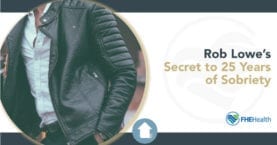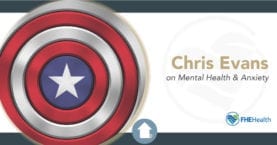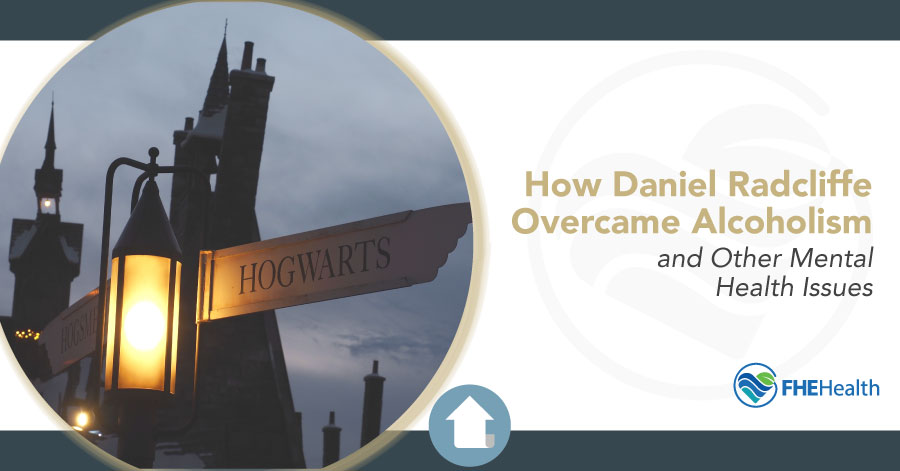
Daniel Radcliffe, the beloved, starring actor of the Harry Potter series and a role model for millions of young people, hasn’t always had it easy. First starring as Harry Potter when he was just 11 years old, he literally grew up in the public eye. As a shy child, he found the constant scrutiny painful and difficult. It only got worse as the Potter franchise progressed. Self-described as “attracted to chaos” and often “dead behind the eyes” when drinking, Radcliffe has waged a battle with alcoholism and a long-standing diagnosis of obsessive-compulsive disorder (OCD), although he kept his drinking secret for years and only in 2012 began talking about his mental health issues….
Start Treatment Now
Treatment can begin quickly and discretely, get started now
Harry Potter – A Curse and a Blessing?
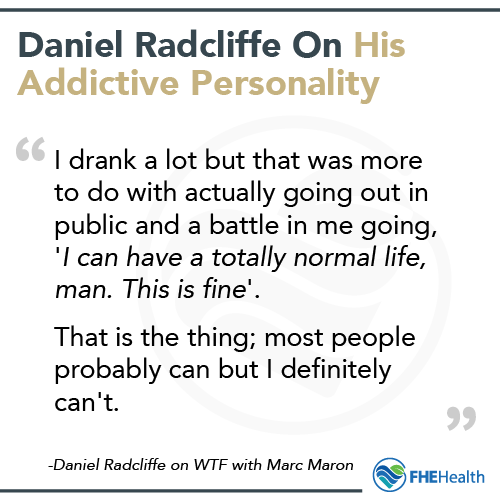 Did he ever seriously consider getting out of the Harry Potter franchise, which now stands at eight films? Radcliffe, now 29, says he did think about quitting the role by the third movie, but claims he was having too much fun at the time. Besides, there weren’t many desirable acting roles for teenage boys, certainly not the caliber of Harry Potter. So, he stayed with the franchise – which, by the way, has made him incredibly wealthy.
Did he ever seriously consider getting out of the Harry Potter franchise, which now stands at eight films? Radcliffe, now 29, says he did think about quitting the role by the third movie, but claims he was having too much fun at the time. Besides, there weren’t many desirable acting roles for teenage boys, certainly not the caliber of Harry Potter. So, he stayed with the franchise – which, by the way, has made him incredibly wealthy.
Radcliffe was an only child of parents who were later to become his managers. While attending a posh, independent school, Sussex House, eight-year-old Radcliffe was told by a teacher that he was stupid. He believed it, which contributed to his lack of self-esteem. He does say he was a talkative and disorganized boy and that he learns more by actively engaging in conversation and walking around, not being told what to do.
Escaping from the shadow of Harry Potter might have been a goal at one time, even fleetingly, although Radcliffe told The Guardian in a 2014 interview that people tend to know his name now and don’t shout “Harry Potter” at him like they once did. The actor is also grateful for the opportunities that opened up for him because of his Harry Potter fame. He adds that if he was bitter about the decade he spent in that role, he’d not be a happy person.
Radcliffe Developed OCD as a Youngster
In 2012, in an interview with The Sun, Radcliffe opened up about his experience with obsessive compulsive disorder (OCD), which is a type of anxiety disorder, saying he developed the mental health condition when he was five. It got to the point where he had to repeat everything he said back to himself, the compulsion was so great. Of course, he felt he had to do so under his breath, thus keeping his compulsive repetitions secret. He also said it took him five minutes to shut off a light. After a referral to a therapist, Radcliffe was finally able to get the help he needed to cope with his compulsions, saying his condition is under control – although he misses his sessions if he hasn’t been in a while. He encourages anyone with OCD to undergo therapy.
Successful OCD treatment may include a combination of medication and certain types of behavioral therapy, such as cognitive-behavioral (CBT) or exposure therapy.
Started Drinking to Cope With Pressures of Being Famous
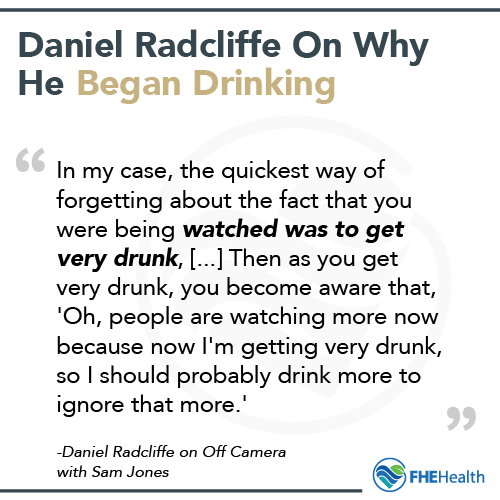 Always self-conscious, Radcliffe said that he always thought people were staring at him, even if they weren’t. Radcliffe admits to making mistakes when he was 17 and 18 and all his friends were out enjoying themselves, while he had no such freedom. He started drinking in social situations to feel he was accepted. Indeed, the tabloids and paparazzi covered his every move in public, including when he was 18 and drunk on a movie set, blacked out from alcohol. The massive attention he received from the media virtually guaranteed that everything he did and said in public would be captured.
Always self-conscious, Radcliffe said that he always thought people were staring at him, even if they weren’t. Radcliffe admits to making mistakes when he was 17 and 18 and all his friends were out enjoying themselves, while he had no such freedom. He started drinking in social situations to feel he was accepted. Indeed, the tabloids and paparazzi covered his every move in public, including when he was 18 and drunk on a movie set, blacked out from alcohol. The massive attention he received from the media virtually guaranteed that everything he did and said in public would be captured.
According to various media accounts, there were frequent episodes of showing up for filming already intoxicated, blacking out frequently, and engaging in risky behavior while under the influence, although Radcliffe says he never drank on the set.
Radcliffe candidly says that he is not the kind of person who does well with alcohol, admitting that he has a “very addictive personality” whose behavior changes in a negative way when he’s drunk. He told Shortlist magazine in a 2012 interview that alcohol made him “pathetic” and a “real bore.” He stated at the time that he was always fearful of people he’d meet, wondering what he may have said or done with them, since his penchant was partying and partying. As a consequence, he’d remain in his apartment and drink by himself for a few days at a time.
Although he started drinking as a way to deal with the pressures of being famous and because of a fear of failure, he completely quit drinking in 2010 because his life was unhealthy and damaging due to excessive alcohol consumption. Radcliffe notes that, “You either have to change something” or give into “that shame,” Radcliffe hasn’t touched a drop of alcohol since.
Road to Sobriety
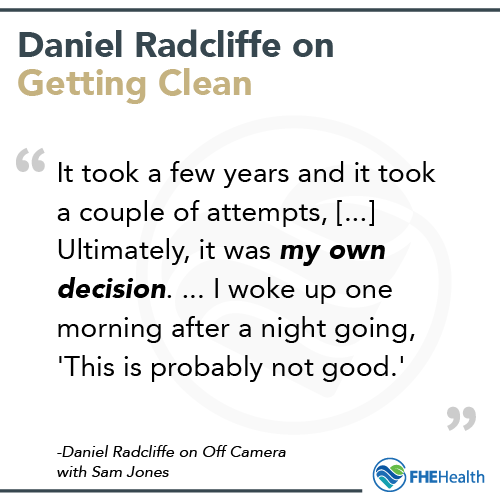 As often happens with those in alcohol recovery, Radcliffe did relapse. Addiction is a disease where relapse is common. Successful recovery is not a matter of merely controlling how much you drink; it requires total abstinence. In 2019, Radcliffe enjoys being sober, saying he’s now more mentally settled and comfortable knowing what makes him happy. In a USA Today article, quoting comments Radcliffe made during an “Off Camera With Sam Jones” interview, the actor says he got clean from alcohol with the help of close friends who encouraged his desire to quit drinking and really cared about his overall well-being.
As often happens with those in alcohol recovery, Radcliffe did relapse. Addiction is a disease where relapse is common. Successful recovery is not a matter of merely controlling how much you drink; it requires total abstinence. In 2019, Radcliffe enjoys being sober, saying he’s now more mentally settled and comfortable knowing what makes him happy. In a USA Today article, quoting comments Radcliffe made during an “Off Camera With Sam Jones” interview, the actor says he got clean from alcohol with the help of close friends who encouraged his desire to quit drinking and really cared about his overall well-being.
“It took a few years and a couple of attempts,” Radcliffe said, speaking about recovery, but it was ultimately his own decision. He added that he doesn’t miss drinking and today is happier minus all the chaos he used to invite into his life.
Start Treatment Now
Treatment can begin quickly and discretely, get started now
How He Stays Clear of Alcohol Today
On recovery, Radcliffe, perhaps through trial and error or the realization of what works well for him, has several go-to techniques to help him stay sober now. Committed to sobriety, he chooses not to consume alcohol in social situations, a huge trigger for him before. According to the Journal of Anxiety Disorders, 25 to 26 percent of people in treatment for OCD also have a substance use disorder (SUD). Furthermore, those with OCD often try to cope with the anxiety and stress by drinking.
What are his coping strategies? In no particular order, Radcliffe’s ways to stay sober include the following:
- Exercise – Radcliffe enjoys running and going to the gym. He’s also a fan of long walks, saying that five-hour walks help him stave off the desire to drink whenever the alcohol cravings surface. Research shows that exercise training can be beneficial as an augment to treatment for alcohol use disorder.
- Reading – While he loved reading as a child, Radcliffe says he couldn’t get into it while he was drinking. He simply lacked the energy to devote to reading. Now that he’s sober, however, he finds great enjoyment and peace of mind reading his books.
- Friends, Shopping, Going to the Malls – Other activities that Radcliffe finds particularly pleasant are hanging out with his friends, shopping, and going to the malls.
- TV Quiz Shows – The mental gymnastics involved with trying to come up with the answer to TV quiz show questions serves as a useful coping strategy to distract from cravings.
Today, Radcliffe is happy in his own skin, enjoying life in sobriety, exploring unique and different roles and continuing to grow as an evolving, kind, and polite individual— one who’s been blessed with rather extraordinary opportunities, as he’s the first to admit. Because of Radcliffe’s celebrity status, his willingness to speak publicly about overcoming his alcoholism and other mental health issues can reach millions of people, perhaps motivating them to seek the help they need for similar issues.
About Kristina Robb-Dover
Kristina Robb-Dover is a content manager and writer with extensive editing and writing experience... read more
